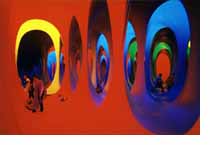
August 2001
The church as a sensual otherworld
Previous Small Fires

 ABOUT A MONTH AGO I went down to Greenwich to see Dreamspace, which was parked for a while outside the UK's National Maritime Museum.
ABOUT A MONTH AGO I went down to Greenwich to see Dreamspace, which was parked for a while outside the UK's National Maritime Museum.Dreamspace is best understood by looking at the photograph – it is an "environment", for want of a better word, half the size of a football pitch, made of coloured fabric held up by air pressure. The extraordinary lighting effects are due entirely to daylight shining through the material, and there is an abstract ambient soundscape which augments the atmosphere.
To enter, you remove your shoes and put on a satin robe coloured to match the Dreamspace. The general effect inside is of a 1960s idea of the 25th century, where people in kaftans drift about in a soft psychedelic city on the planet Zarg. All a bit Barbarella.
It was instructive to watch how people behaved. They wandered round dreamily, drinking in the intense light and mystery. They sat meditatively in quiet corners, they engaged in spontaneous dances, acrobatics, trying to be upside-down. I'm sure this was partly due to the robes, giving people licence to be and behave differently.
AFTER BEING UPSIDE-DOWN and thinking for a bit myself, it seemed to me that Dreamspace is a contemporary equivalent to a church building, not as we know them now, Jim, but as they functioned in medieval times.
When people lived in mud huts, wore rags and waded through shit, the church building was a sensual otherworld, an immersive environment where people wore richly coloured robes and the windows blazed with coloured glass, the walls were painted and gilded, where there was height and space and light and singing. It was a deliberate attempt to model heaven.
So how come we leave it to Dreamspace to do that now?
IN A TV-SATURATED SOCIETY, it takes more than a bit of stained glass to impress the masses. The volume has to be turned up all the way to overload, which isn't easy in a grey stone building with one working power socket.
The nearest thing to it, of course, is in traditional Catholic or Orthodox churches where all the senses are engaged, and the mind, too, in interpreting it all, and much of the activity is individual and self-directed – people coming in and out at any time, to sit and pray, light a candle, meditate a while on an image, soak up the atmosphere, take a break, take the sacrament.
The Reformation sometimes looks like a case of baby and bathwater. In neglecting the sensual for the explicable we damage our ability to model the Otherness of God.
A feature of our society is the search for Otherness rooted in the physical – as manifest in extreme sports, martial arts, body modification, experiments with drugs. Many of the people who do these things are quite explicit about their spiritual motivations. It seems to me that this instinct to touch the spiritual through physical extremity is telling us something about our humanity that we have partially forgotten in a comfortable world.
In recent years there has been a great rediscovery of the biblical understanding of human nature, that for us body and spirit are not separate entities but one and indivisible. But if body and spirit are indeed one, the hunger for extreme physical experiences is a hunger for spiritual experiences.
TO A MEDIEVAL PERSON the church building gave unparalleled sensual pleasure as an analogy and actual foretaste of heaven. Maybe church was even better than sex, given how little people washed back then. And chocolate hadn't been invented. No doubt if our own church environments gave intense sensual pleasure they would be as popular as Dreamspace or a rave.
The hunger of our senses for intense overwhelming experience is in fact a legitimate hunger for the full filling for which they were made, which will only be found fully in the full presence of God. Just as the mind will be requited, so too the senses.
Some kinds of Christianity have emphasised the fallenness of the senses, their capacity to lead us into sin, while forgetting the equal fallenness of the mind and its capacity to lead us into sin. Of course, this denial of the senses is itself part of the fallenness of the mind!
So what if our churches were as ravishing and playful as Dreamspace – or were Dreamspaces, too? Would people come into the church just for the pleasure of light and sound and space (dream on!). But would the pleasure itself be the carrier of God, as much as we expect, say, the words of a preacher to be? Can sensual pleasure be spiritual experience – be a vehicle of evangelism?
Top | Bio | Columns | SOF Home
© Ship of Fools 2001